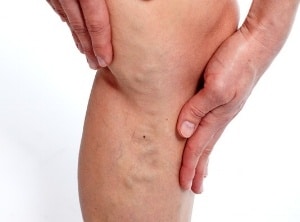
How to Treat Bleeding Varicose Vein and Bleeding Spider Veins
What can you do to treat bleeding varicose vein and spider veins?
First and foremost, don’t panic. Although the visual effect of a ruptured varicose vein or bleeding vein can be alarming, there are some simple things that can be done to get the bleeding to stop.
If you can reach the area that is bleeding, grab a tissue, wash cloth, towel, or whatever is handy and apply firm pressure. Hold the pressure for at least five minutes before “checking” to see if it has stopped. If you cannot reach the area, ask a family member, neighbor, or friend for help. Again, these bleeding veins look alarming but it would literally take several hours to “bleed to death” from a varicose vein rupture.
In addition to applying pressure, elevate the leg. If you don’t want to risk bleeding on the couch, bed, floor, throw a plastic bag underneath the area that is bleeding to protect fabric. A cold compress (ice, frozen peas, etc.) near the area that is bleeding will cause the blood vessels to constrict and help stop the bleeding. Finally, breathe. Slow deep breathing will help lower your blood pressure and heart rate which will help slow the bleeding.
Get a Full Vein Screening
It is important to have a lower extremity vascular evaluation. Bleeding veins can be a symptom of a larger vascular issue. There are vein treatment options which can eliminate bleeding varicosities, underlying venous problems, and the symptoms associated with them. Contact our vein specialist to schedule a complete venous evaluation and discuss appropriate treatment options.
After Bleeding Stops
One way to get blood out of clothing is to saturate the area in hydrogen peroxide. If you don’t have hydrogen peroxide handy, rinse the article in cold water and leave it damp until you can use the peroxide.
Question: What can a venous reflux exam tell me? How does this treatment measure my veins effectiveness?
Read MoreQuestion: How long does the actual varicose vein surgery itself take and how much time should I expect for the recovery?
Read MorePregunta: ¿Cuáles son las mejores maneras de juzgar las calificaciones de un médico para el tratamiento de las venas? Mis venas están en forma horrible, y me dijeron recientemente que necesitaría 5 procedimientos diferentes de ablación y 6 citas de escleroterapia después. Tuve mi primer procedimiento VNUS por un médico de la vena en Gilbert…
Read MorePregunta: tuve mis inyecciones (escleroterapia) hace 3 semanas (no en el Instituto de vena avanzada de Arizona). Mi tobillo todavía está terriblemente hinchado. He vuelto dos veces para una ecografía y ningún coágulo. ¿Cuánto dura la hinchazón normalmente? Yo camino y no usar mis medias como se indica. Me está disuadiendo de continuar el tratamiento,…
Read MoreQuestion: What are the best ways to judge a doctor’s qualifications for vein treatment? My veins are in horrible shape, and I was recently told that I would need 5 different ablation procedures and 6 Sclerotherapy appointments afterwards. I had my first VNUS procedure by a vein doctor in Gilbert on the greater saphenous vein, and…
Read MoreQuestion: I had my injections (Sclerotherapy) done 3 weeks ago (not at Advanced Vein Institute of Arizona). My ankle is still terribly swollen. I’ve been back twice for an ultrasound and no clot. How long does the swelling normally last? I walk and did wear my stockings as directed. It is deterring me from continuing treatment…
Read MorePregunta: ¿se pueden tratar las venas normales? Así que tengo venas de color verde azulado muy largas en mi muñeca. Sé que hay normalidad pero odio cómo se ven. ¿Puedo tratarlo con escleroterapia? También tengo 2 largas venas verdes en mi pecho. ¡Ayuda! También tengo 15 años, ¿puedo pasar por la escleroterapia?
Read MoreQuestion: Can normal veins be treated? So I have normal very long green bluish color veins in my wrist. I know there normal but I hate how they look. Can I treat it with sclerotherapy? I also have 2 long green veins in my chest. Help! Also I’m 15, can I go through sclerotherapy?
Read MorePregunta: Tengo 50 años de edad; un soltero, y un maestro. En este momento tengo varices (aunque no son dolorosas) en mi pierna derecha. No estoy feliz de verlos. ¿Qué puede sugerir para disminuir su visibilidad?
Read MoreQuestion: What is “extensive vascular calcium deposits” when shown on X-rays?
Read More